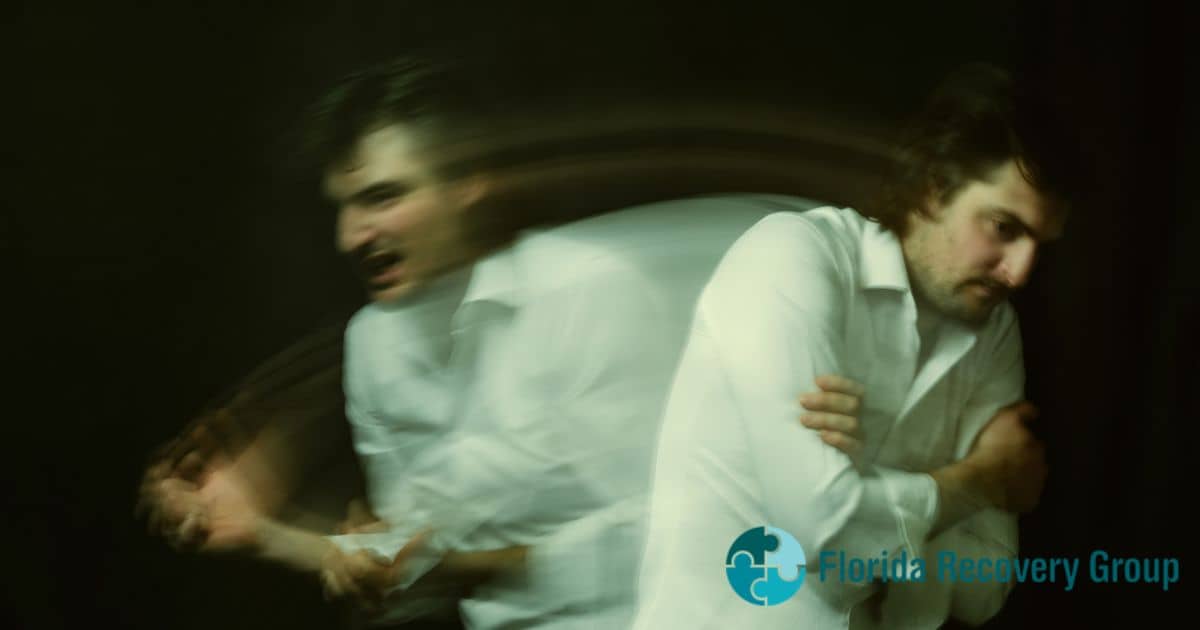
29 Jun How Do You Know if You’re in a Manic Episode?
Bipolar disorder is a mental health condition that causes individuals to experience dramatic shifts in their mood and energy levels and changes in their ability to carry out daily tasks. These shifts in mood are more significant than the normal ups and downs that everyone experiences in their life. If you have bipolar disorder, you will experience depressive and manic episodes that can last for a few days to a couple of weeks at a time.
An estimated 4.4% of U.S. adults experience bipolar disorder at some time in their lives.[1]
When you struggle with bipolar disorder, sometimes it can be difficult to determine whether you are in a manic episode. Mania can present in a variety of ways, sometimes making you feel like you are in a wonderful mood, looking forward to the future, and untouchable. Feelings of mania can almost be addictive, making you think that you are doing good when in reality you are at risk of experiencing the consequences of mania.
What is a Manic Episode?
Manic episodes are periods where you display over-the-top levels of energy, activity, mood, and behaviors. Some common symptoms of mania include less need for sleep, feeling invincible, racing thoughts, planning for the future, impulsive behaviors, and having false beliefs or perceptions. While others might notice an extreme difference in your behavior, it could be difficult for you to identify a manic episode on your own.
While mania can occur in other conditions like schizoaffective disorder or postpartum psychosis, it is most common among individuals with bipolar disorder. Bipolar disorder is characterized by experiencing periods of severe depression and manic episodes, with each state of mind and behavior possibility lasting for up to six months without treatment.
If you experience manic episodes, you must reach out to a mental health provider for diagnosis and treatment. Without professional support, your manic episodes can lead to severe impulsive behavior that could have lasting consequences on your life.
What Triggers Manic Episodes?
When you suffer from bipolar disorder, you might begin to notice that certain things trigger your manic episodes. While mania can happen out of nowhere, there are usually a couple of factors that are present right before your manic episodes start. Being able to identify your triggers for mania can help you prevent your episodes from becoming severe.
Common triggers for manic episodes include:
- Being in highly stimulating environments, like concerts or other places with large crowds of people and bright lights
- Major life changes like a divorce, marriage, moving, or a new job
- Not getting enough sleep
- Substance abuse
- Difficult life situations
- High levels of unmanaged stress
Being aware of the situations that precede your manic episodes can help you prevent them in the future. If you notice that every time you experience mania you were facing a lot of stress at work and losing sleep, it might be a good idea to maintain a healthy sleeping schedule and double down on stress management techniques.
Recognizing the Symptoms of Mania
Manic episodes often cause people to feel like they do not need a lot of sleep, behave impulsively, or have high levels of energy. However, it is important to note that mania can affect everyone differently. While some people experience extreme happiness and a bright outlook for the future, others may experience fits of anger, anxiety, and paranoia.
Common symptoms of a manic episode include:[2]
- Having an abnormal amount of energy
- Feeling extremely happy or excited to the point that you are euphoric
- Not getting enough sleep but still feeling rested
- Having an inflated self-esteem or feeling like you are invincible
- Being very talkative or talking extremely fast
- Experiencing racing thoughts
- Being easily distracted by unimportant things or ideas
- Becoming obsessed with an activity
- Pacing or fidgeting when you attempt to sit still
- Behaving impulsively, such as spending money you do not have or engaging in substance abuse
- Experiencing delusions and hallucinations
If you or a loved one are experiencing the symptoms of mania, your next steps should involve professional help. The type of treatment necessary will depend on the severity of your symptoms. If you are experiencing reckless behavior, delusions, or hallucinations, hospitalization may be necessary.
However, if your mania does not include severe symptoms, you might find relief from visiting a therapist and considering getting on medication. Either way, manic episodes must be treated by a mental health professional. Even mild cases of mania can lead to severe consequences when left untreated.
Get Help for Bipolar Disorder
If you or a loved one are diagnosed or suspect you have bipolar disorder, it’s time to seek professional help. Florida Recovery Group can provide you with an in-depth assessment to determine whether you struggle with bipolar disorder and create an individualized treatment plan that helps you learn to manage your condition.
To learn more about our mental health treatment program, contact Florida Recovery Group today.
References:
- The National Institute of Mental Health (NIMH): Bipolar Disorder, Retrieved June 2023 From https://www.nimh.nih.gov/health/statistics/bipolar-disorder
- The National Institutes of Health (NIH): Mania, Retrieved June 2023 From https://www.ncbi.nlm.nih.gov/books/NBK493168/





